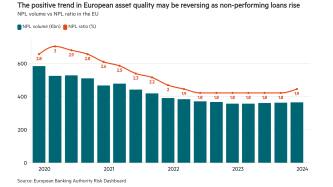Greek banks plan to open more than 300 new branches outside the country this year in a drive to capture a bigger market share in south-east Europe.
The accelerating pace of expansion reflects increasing demand for loans in the ‘new’ Europe, underpinned by high economic growth rates, strong inflows of foreign investment and falling unemployment. And EU accession for Bulgaria and Romania at the start of this year has given the business climate a further boost.
Greek banks have an estimated 19% share of lending and control the largest branch network in the Balkans, but face intensifying competition from other EU-based banks. With privatisation nearly completed, consolidation of small private lenders will be the next step. But prices are high, with recent deals going through at three-and-a-half to four times book value.
Early movers
Greek banks were first movers in the Balkan market in the early 1990s, following corporate customers making cross-border investments. Small branch networks and two greenfield operations were established. A string of acquisitions followed as political and economic stability improved. Greek companies, including the banks, are estimated to have invested more than $10bn in the region since the demise of communism.
Seven Greek banks control more than 30 subsidiaries or branch networks in 10 countries – Albania, Bulgaria, Cyprus, Egypt, Macedonia, Poland, Romania, Serbia, Turkey and Ukraine. The total number of branches exceeds 2000 with more than 25,000 employees.
Lending is expanding fast but from a low base. With an average loan-to-GDP ratio of 40%, compared with 70% in Greece, south-east Europe offers an unprecedented opportunity for Greek banks. Last year, the Balkans contributed about 10% of Greek banks’ net profits, which were mostly reinvested to expand branch networks. Leading banks are aiming for 20%-25% by 2010.
National Bank of Greece has raised the stakes by making the first acquisition by a Greek lender in Turkey, previously seen as an unfriendly environment because of long-standing disputes over control of the Aegean Sea. But Turkey’s prospects for EU membership, on top of a political rapprochement and rising bilateral trade flows, significantly reduce the risk, says NBG chairman Takis Arapoglou.
The acquisition of Finansbank, a fast-growing private lender, doubled NBG’s market at one stroke from 60 million to 130 million people.
“If your strategy is to become a regional player, you can’t ignore your biggest neighbour. Turkey is committed to getting closer to Europe, its economy is growing steadily, and it is still under-banked. We think we made an excellent investment,” says Mr Arapoglou.
Group lending is forecast to rise by 35% yearly in Turkey and 40% in the rest of south-east Europe.
Finansbank joins United Bulgarian Bank, the country’s third largest lender with a 17% market share, as the group’s biggest international subsidiaries. NBG’s strategy in both markets has been to leave strong local managers in place and retain the existing brand-name.
NBG last year consolidated its presence in Serbia by acquiring Vojvodjanska Banka, a regional lender based in Novi Sad, in a privatisation sale. But the €360m price tag – four times book value – was seen as expensive. NBG paid €25m of the purchase price into an escrow account for recovering loans owed to the state and undertook to keep the 2500-strong workforce for at least three years.
Key market
Serbia is considered a key market by Greek companies, with strong growth potential in spite of continued political risk. The Vojvodjanska deal added another 170 branches to NBG’s existing network of 35 branches in Serbia, increasing its market share to 9% of loans and 8% of deposits.
In Romania, the biggest Balkan market, NBG lost out when the government decided to cancel the sale of 70% of Casa de Economii si Consemnatiuni, the country’s fourth largest bank. NBG was the only bidder in the final round with an offer of €560m, after Raiffeisen and Hungary’s OTP, the other short-listed contenders, pulled out.
As a result, NBG has opted for organic growth through its subsidiary, Banca Romaneasca, in which the European Bank for Reconstruction and Development holds a 10% stake. After doubling the network to 76 branches last year, NBG plans to open another 120 branches by 2009 with the aim of capturing a 3% market share of both loans and deposits.
NBG’s pre-tax profits from south-east Europe increased 45% to €125m in 2006, amounting to 11% of group pre-tax profits. Finansbank contributed another €85bn, having been fully consolidated for the final four months.
Both EFG Eurobank and Alpha Bank, the second and third largest Greek lenders, have followed NBG into Turkey, albeit more cautiously. Eurobank, which already controls an Istanbul brokerage house, paid €140m for 70% of Tekfenbank, a small business lender with a network of 31 branches. It is part of the private Tekfen group, which specialises in large infrastructure projects.
Eurobank plans to expand the network to about 100 branches to cater mainly to small and medium businesses at first and later to corporate lenders. “Turkey is a promising market but it requires a different approach. We’re not moving aggressively,” says Nikos Nanopoulos, Eurobank’s managing director.
Joint venture
Alpha is awaiting approval from Turkey’s central bank and capital markets commission for a banking joint venture with Anadolu, one of the country’s biggest industrial holding groups and the Coca-Cola franchise holder for Turkey. Anadolu has spun off Alternatif Bank, its banking subsidiary, into a holding company with Alpha as a 50% partner.
Alpha will contribute $492m in cash to Alternatif Holding, the new entity, while Anadolu has included its leasing and brokerage companies along with the bank. “You need a strong partner in Turkey, and we knew Anadolu quite well, so it’s a good fit. We plan to grow fast, adding 100 branches in the next three years,” says Marinos Yannopoulos, Alpha’s general manager.
Alpha’s previous major acquisition in the region was Jugobanka in Serbia, purchased two years ago for €171.5m. Lending growth has been slow – up just 11% in 2006, compared with 54% in Romania and 73% in Bulgaria – because of low incomes and the country’s continued political isolation, which deters corporate investors. “You’re going to have ups and downs in these markets, but you accept them because we’re here for the long term,” says Mr Yannopoulos.
Alpha’s south-east Europe operations contributed €70m to group net profits last year, led by a strong performance in Cyprus, the region’s most developed market.
Eurobank, which is part of a Swiss-based chain of private banks controlled by the Latsis family group, claims to be Greece’s first truly international bank with more than half its branches outside the country. The group’s reach is the widest of any Greek lender, with subsidiaries in Bulgaria, Poland, Romania, Serbia, Turkey and Ukraine.
Last year, Eurobank paid €160m for 75% of DZI, a private Bulgarian bank, which will be merged with PostBank, acquired in a privatisation sale a decade ago.
In Poland, the group has accelerated the roll-out of its branch network. The €200m greenfield operation marks the first time a Greek bank has entered a central European market. “Business has grown faster than forecast, in line with our view that the Polish market was under-penetrated,” says Mr Nanopoulos.
Excluding start-up losses in Poland, Eurobank’s international operations contributed €29m to net profits last year, led by Bulgaria – the market where Greek companies are most active.
Balkans bound
Piraeus Bank, Greece’s fourth largest but fastest-growing lender, has followed its bigger peers into the Balkans by acquiring small private banks in Bulgaria, Serbia and Romania and investing in network expansion.
Piraeus is the only Greek bank to have set up a subsidiary, rather than a branch network, in Albania. Tirana Bank has a network of 36 branches handling migrants’ remittances and loans to small business that has built a market share of 14%. Piraeus is also the first Greek bank to have made an acquisition in Egypt. After-tax profits from international operations jumped 74% last year to €40m, led by Bulgaria.
Piraeus is preparing to follow Eurobank and Marfin Popular Bank into Ukraine, says Michael Colakides, deputy chairman. Both banks have acquired small regional lenders, while NBG and Alpha have also been exploring possible acquisitions. At the same time, Tirana Bank’s rapid expansion has kindled Piraeus’s interest in other small markets in the west Balkans.
“We’re looking at Montenegro, Macedonia and Kosovo. These are small places but they are seriously underbanked and we believe they have good growth potential,” says Mr Colakides.
Bulgaria, Romania and Serbia are seen as the region’s core markets, where Greek banks are poised to profit from sustained high growth rates and closer European integration. Turkey, Ukraine and perhaps Egypt – all much bigger markets than the Balkans – will be important to future expansion.
With forecasts for compound annual growth rates for lending ranging from 35% to more than 50%, the banks’ three-year growth targets for regional operations sound ambitious, but as Mr Colakides puts it: “These markets have a dynamism all their own.”Market Shares of Greek Commercial Banks in 2005











